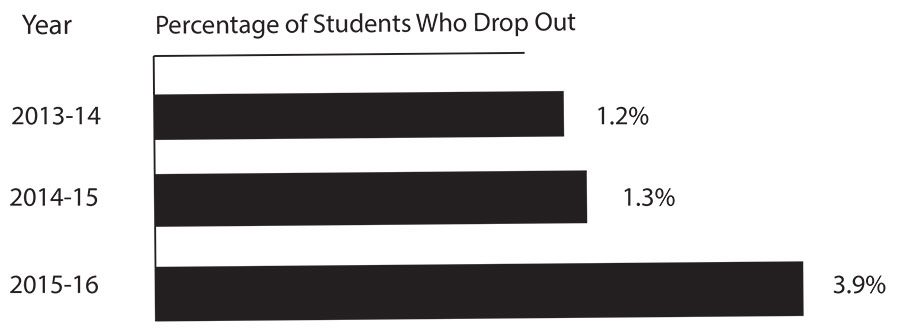Students who drop out of school have difficulty gaining jobs, receiving GED
Many students walk into the high school with the intention of exiting with a diploma in their hands. However, that idea does not always become a reality. A percentage of students change their minds within the four years that it takes to graduate for various reasons. Recent numbers highlight that dropout rates have in fact risen compared to the previous years. Percentages gathered from the state fluctuated from 1.6% in 2010-11 to 2.2% in 2012-13, to a large contrast of close to 3.9 % in the 2015-16 school year.
“I think that most students decide somewhere around their sophomore year that school might not be for them. It depends on where they are, if they are on target to graduate or are not on target to graduate. Whether or not they have failed some classes as freshmen or sophomores and how can they be resilient and make up those credits,” principal Lisa Moore said.
Dropping out of high school is often not as easy as simply walking out of the front doors. If a student is sixteen or under a parent has to sign a form approving their choice to drop out. This complicates matters for some students making it more likely for a junior or senior to drop out rather than a freshman or sophomore.
“Most students do not just sign a disclaimer. We have had lots of conversations with them, counselors have had lots of conversations with them or the administrators have had conversations with them. A student cannot just sign out of school, they have to have a parent sign up until the age of eighteen. When they turn eighteen they most generally just stop attending and we drop them from our attendance rolls. They cannot go to the GED program though without having signed a disclaimer,” Moore said.
Students who decide to drop out often do not make the decision at random. There are normally reasons behind this choice, often influence by their studies.
“ If they are not meeting requirements, and learning things that they need to learn in sixth, seventh, and eighth grade then when they come here it is tough. A lot of times freshmen do not quite grasp the idea that if they fail a class they have to make it up to earn the credits to graduate. They decide that it is no big deal, and then they are behind on credits, which makes them discouraged that in their minds they cannot make up the credits,” Counselor Brad Cooper said.
Dropping out of high school creates many challenges. Even the GED program presents its own set of problems.
“Obviously employment will always be difficult for them, they will struggle. There is a lot of things to think about. I know for example the class of 2007, they are getting ready to have their ten year reunion here in September. I don’t know how many of them I see posting online about how they wish they had finished high school, who wished they had not quit going to school when they did, because life is a struggle,” Moore said. “A GED is much more challenging than most think it is going to be; they think that they are going to go take a test and then they are done. There is a reason why the GED programs are so successful, that is because they are not going to allow you to test until they know that you are going to pass. So that may take you six months, or that might take you six years.”

Morgan is a senior and is a first year staff member. She is the Features Editor for The Newtonian. She is involved in Société Honoraire de Français...

Caroline is a senior and has been part of The Newtonian newspaper staff for three years. For the past two years she has served as a reporter and will be...











